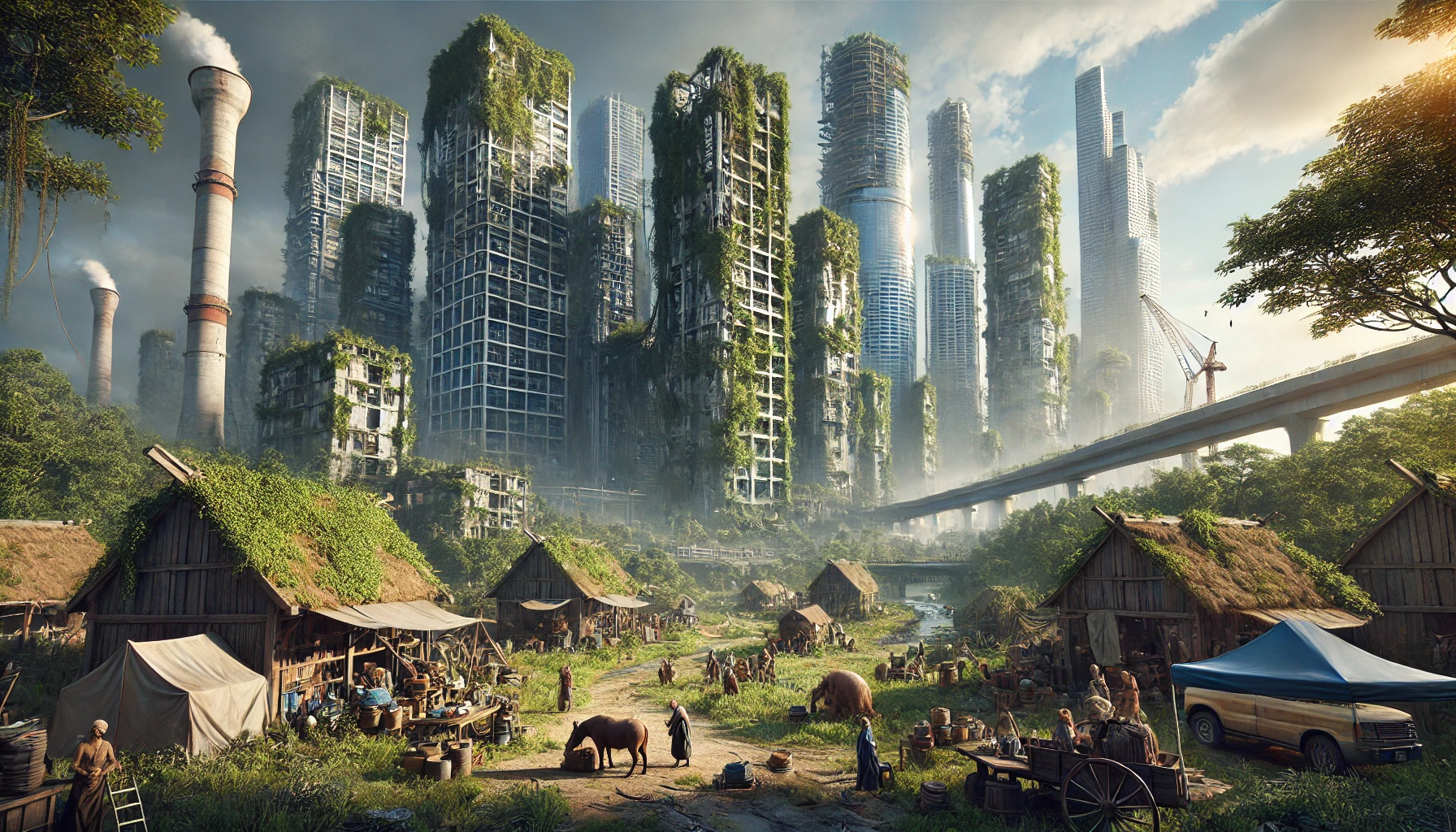Lifestyle
Will Overshoot Revert Society to a Simpler Lifestyle? Here’s What You Need to Know

Introduction
Hook
Many people feel uneasy about Earth’s resources. We often take more than nature can replace. That is overshoot. A big question follows: “Will overshoot revert society to a simpler lifestyle?”
Context
Resource depletion grows day by day. Warmer weather brings storms and droughts. Pollution harms food supplies and clean water. These events raise alarms. People wonder if our modern world can keep going or if we must change how we live.
Purpose
This article will explore overshoot. It will show why it matters, how it happens, and what it might mean for our future. We will also look at past societies that hit limits and fell. At the end, we will return to the question: “Will overshoot revert society to a simpler lifestyle?” and see what lessons we can learn for today.
Understanding Overshoot
Defining Overshoot
Overshoot happens when humans demand more resources than Earth can renew. Soil loses nutrients. Water dries up. Forests vanish. Past civilizations sometimes overused land and forests. The Mayan and Easter Island societies faced this problem. They took more from nature than nature could replace. That led to collapse and hunger.
Common Causes of Overshoot
Population grows. Factories run day and night. People buy more goods and burn more fuel. Technology boosts production. Economic rewards encourage big industries to expand. The result is resource strain.
Signs We Might Already Be in Overshoot
Air warms. Glaciers melt. Droughts spread. Farms struggle. Animals disappear. Local shops stock less food. Costs rise. Some families cannot afford basics. Many wonder, “Will overshoot revert society to a simpler lifestyle?” That question reflects deep concern about the future of our world.
Historical Patterns: Growth, Collapse, and Simplification
Case Studies of Past Societies
The Roman Empire stretched across continents. Farmers supplied grain, and trade routes spread goods. But farmland grew tired. Imports drained distant lands. People became dependent on wealth from faraway regions. In time, the empire crumbled.
The Maya built grand cities and complex calendars. They planted crops for large populations. But droughts came, and soils wore out. Life grew harsh, and cities fell into ruin.
Easter Island people carved giant statues. They cleared trees to move those statues. Soon, wood was scarce. Community life fell apart. Violence followed. These examples show how overshoot leads to decline.
Lessons Learned
When resources vanish, people often switch to simpler methods. Big systems collapse, and smaller groups endure. We see that overshoot can spark big changes. Some wonder, “Will overshoot revert society to a simpler lifestyle?” Past events suggest it could.
Adapting and using land or water in a balanced way may prevent disaster. We learn that resource limits matter. Sustainable practices help communities last. If we respect nature’s boundaries, we avoid dire outcomes.
The Environmental Pressures Driving Simpler Lifestyles
Resource Depletion and Climate Change
Fossil fuels run low. Clean water grows scarce. Farmland loses fertility. These issues can force people to cut back. Some communities shift to simple habits. They use less power and grow local food. Experts see overshoot pushing us to rethink our lifestyles.
Warmer weather brings stronger storms. Sea levels creep higher. Crops fail when droughts last too long. These changes strain budgets. They also limit food. People ask, “Will overshoot revert society to a simpler lifestyle?” This question prompts a closer look at minimalism and resource conservation.
Waste and Pollution
Plastic ends up in rivers and oceans. Trash piles up. Toxic chemicals spread. Wildlife suffers. Humans feel the effects of bad air and dirty water. Reducing consumption helps. Less waste means fewer plastic bags and bottles. Families save money when they buy only what they need.
Big companies try to cut pollution. Some support recycling programs. Others switch to eco-friendly packaging. These choices help preserve land, water, and air. Simple steps—like carrying reusable bags—make a difference. That often leads to a mindset of living with less. It also eases the pressure on our planet.
Socioeconomic Tipping Points
Economic Systems at Risk
Global trade moves goods quickly. Supply chains feed distant stores. Disruptions shake markets. Trade wars or sudden shortages hurt many businesses. This can trigger economic downturns. Jobs vanish. Bills climb. People cut spending and live with less. Some ask, “Will overshoot revert society to a simpler lifestyle?” Financial stress nudges groups toward simpler ways.
Inequality and Social Tensions
Many people struggle to buy healthy food or pay rent. Others enjoy luxury homes. This gap stirs conflict. When resources shrink, these tensions grow. Communities sometimes choose local farming or handmade crafts. They focus on shared gardens or barter systems. These low-tech methods reduce reliance on big companies. They also boost neighborly bonds in hard times.
Cultural Shifts Toward Minimalism
Voluntary simplicity grows popular. Tiny homes reduce clutter and expenses. Anti-consumer groups urge people to buy only what they need. This movement seems to reflect deeper worries about overshoot. Many sense that modern life may not last. They seek safety in a smaller footprint. They value peace of mind over piles of stuff.
Technological Advances Versus the Call for Simplicity
Can Technology Solve Overshoot?
Solar panels capture sunlight. Wind turbines harness breezes. Carbon capture machines store greenhouse gases. Many see these solutions as promising. They hope clever tools can reduce carbon and keep the planet stable. Some ask, “Will overshoot revert society to a simpler lifestyle?” They wonder if new gadgets might ease our impact on Earth.
Some experts doubt that tech alone can fix everything. Rare metals are needed. Factories and transport lines stretch across oceans. That drains resources. Tech requires energy to build and maintain. These actions might increase pollution. Some worry that high-tech paths risk pushing overshoot further.
Balancing Innovation and Simplification
Some groups aim to use tech in careful ways. They pick tools that handle basic needs without excess. Tiny farms use smart irrigation systems. These help crops grow with minimal water. Local makers use 3D printers to produce goods near home. That cuts shipping and packaging waste. Closed-loop systems recycle scraps, turning leftovers into new products.
This selective approach might help manage overshoot. It blends forward thinking with caution. Many feel a balanced path could prevent big crises. They choose to rely on tech for vital tasks while living simply. This mindset reflects the question, “Will overshoot revert society to a simpler lifestyle?” Perhaps tech can help, but only if we use it wisely.
Potential Pathways to a Simpler Lifestyle
Intentional Communities and Eco-Villages
Some people join eco-villages or intentional groups. They share land. They build small homes and grow crops. They use local materials and limit waste. They aim for balance with nature. Many collect rainwater or rely on solar power. They see this as a new way to live. They learn skills like sewing or beekeeping. They share tools instead of buying new ones. They also share food. This lifestyle feels peaceful. These communities reflect a possible answer to the question, “Will overshoot revert society to a simpler lifestyle?”
Government Policies and Global Agreements
Leaders can change rules. They can tax carbon or give green rewards. This nudges big industries to reduce pollution. Some governments cut the price of solar panels. Others support farmers who protect soil and water. Global deals ask countries to work together. This can prevent chaos if overshoot speeds up. Many see this as a smart path. It guards resources. It also boosts local jobs and keeps air and water cleaner.
Individual and Collective Actions
Everyday choices shape the future. People can reduce plastic or buy secondhand goods. They can start small gardens for fresh food. Neighbors might create shared libraries for tools or books. This bonds communities. It also cuts spending. These small steps soften overshoot’s blow. They may lead us to simpler routines. They may also protect local resilience. Many wonder if these actions answer the big concern, “Will overshoot revert society to a simpler lifestyle?” Only time will tell, but mindful habits bring hope.
Challenges and Criticisms
Resistance to Change
Modern life often relies on gadgets and quick comforts. People enjoy fast deliveries and online streaming. They do not want less speed or fewer choices. This mindset makes a simpler life seem unattractive. Many industries also depend on high sales. If society buys less, some factories or shops may close. Workers lose jobs. This reality slows any shift toward minimalism.
Fear of Regression
Some worry that stepping back in technology means worse health care or slower communications. They fear losing progress in medicine or science. Life off-grid can look hard. People think it means no electricity or a return to primitive tools. In truth, simpler living does not always mean living in isolation. It can mean careful use of resources instead of total rejection of tech.
Ethical and Equity Issues
Poor communities often bear the biggest costs of any shift. If rules ban cheap goods, families with low income struggle first. Some question if forced simplicity is truly good or just another limit on personal freedom. Others ask if we must protect the most vulnerable during this transition. They see the debate as part of the bigger issue: “Will overshoot revert society to a simpler lifestyle?” The answer depends on fair policies and balanced solutions.
Will Overshoot Revert Society to a Simpler Lifestyle?
Current Signals
Minimalism grows popular. People learn old skills like gardening or sewing. They push for cleaner energy. Many join clean-up events or protest wasteful habits. These efforts show concern over resource scarcity. Experts warn we may face food or water shortages soon. Some predict big social changes, such as local barter markets or communal living. They link these shifts to the question, “Will overshoot revert society to a simpler lifestyle?”
Is It Inevitable or a Matter of Choice?
Some say we can plan ahead. We can adopt slow fashion, local food, and greener cities. Futurists see a chance for new jobs in renewable energy or recycling. Economists note that lowering demand might stabilize prices. Others believe big shocks may force us into simpler habits anyway. These views raise another point: could early action prevent a sudden collapse?
Possible Future Scenarios
Best-Case: People willingly shift toward sustainable living. Society uses green power, respects nature, and still keeps good health care. Life might still be comfortable.
Worst-Case: We keep using resources until shortages hit hard. Trade breaks down, and factories close. Everyone scrambles to survive. That forced simplicity could be harsh and chaotic.
These scenarios revolve around the core question, “Will overshoot revert society to a simpler lifestyle?” The outcome depends on our choices now. If we prepare and act with care, we may find a balanced path that avoids crisis.
Conclusion and Call to Action
Overshoot can push people to live with fewer wants. It can spark a move toward local food, green energy, and a slower pace. Some seek simple habits by choice. Others may have no option if resources vanish. Communities can share tools and knowledge. Policymakers can steer us away from waste. These steps ease the strain on land, water, and air.
“Will overshoot revert society to a simpler lifestyle?” The answer may depend on our actions now. We can pick smaller homes, healthier diets, and eco-friendly policies. We can prepare before crises arrive. That choice leads to a fair, balanced future. Or we can ignore these signals and face rough changes later. Our best path is to act with care, think long-term, and respect Earth’s limits.
Thank you for visiting our blog! If you enjoyed this post, feel free to check out more interesting and helpful content here.
-

 Entertainment3 months ago
Entertainment3 months agoAura of Vitality 5e: A Complete Guide to Healing and Support in Combat
-

 News3 months ago
News3 months agoLove2Love.lv: Your Guide to Engaging and Reliable Content
-

 News3 months ago
News3 months agoJustTheGays: A Safe and Inclusive Space for the LGBTQ+ Community
-

 Fashion3 months ago
Fashion3 months agoWhat are the Differences Between Microlocs vs Sisterlocks?
















